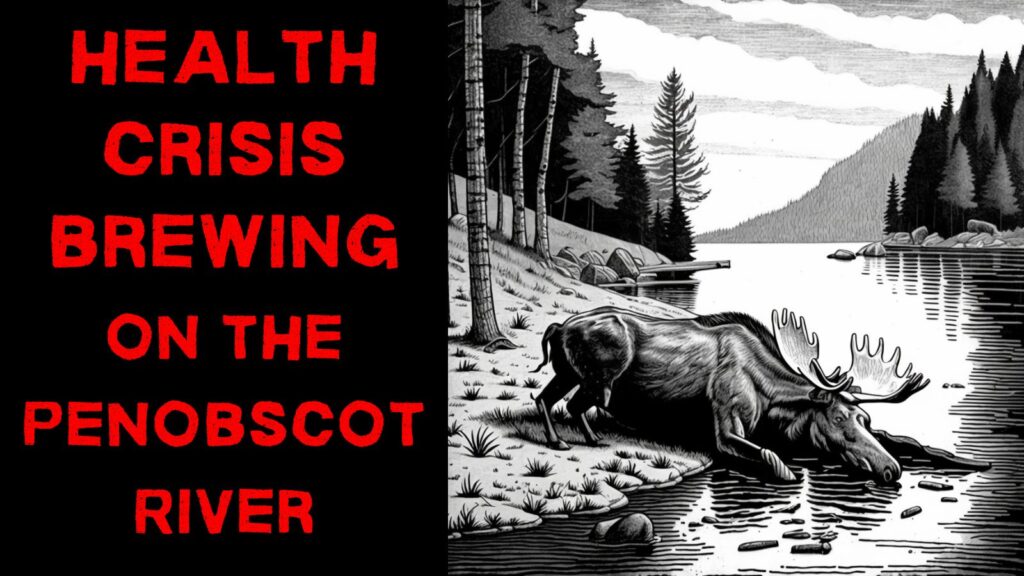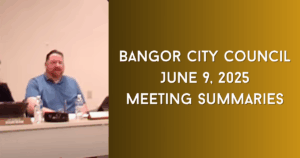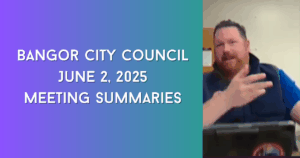
Amanda Smith, Bangor’s Director of Water Quality Management informed Bangor City Council on Monday, February 27, 2023, we have a potential human health and environmental crisis brewing, and it could happen within two weeks.
It stems from laws that were recently passed that were aimed at reducing the amount of PFAS chemicals that are being absorbed into the soil in Maine. Typically, the sludge that is produced by these water treatment plants was being used as fertilizer. Turns out, putting poison into the ground ends up hurting people. Go figure. LD 1911 put a stop to the practice.
The bill was signed into law April 20, 2022, giving everyone 10 months to prepare. We learned this week that there was no plan B. When the landfill reached unsafe levels for additional loads of this sludge, Casella had to start trucking it off to other places. The call went out only the Thursday before, and municipalities have to cut back on how much sludge they can send out. They’re quickly running out of space to keep excess sludge, which means it’s going to start going out into Penobscot River untreated.
The clock is ticking. 10 days left.
The Highlights
Amanda Smith’s Full Statement to Bangor City Council
Transcript of the full comments:
[00:00.000 –> 00:16.000] All right, and then I just have one more item. Um, water quality director Amanda Smith is here with me, um, to provide a more detailed sort of overview about what’s going on related to our, um, our sludge disposal.
[00:16.000 –> 00:40.000] Amanda, I always have the fun topic, so it’s a little bit more serious conversation at this point. I just want to refresh some memories on about a year ago at this time we were discussing some pending legislation that was LD 1911 that was a prohibition of land application of
[00:40.000 –> 00:52.000] biosolids and simultaneously there was a bill pending LD 1639, which curtailed the inflow of construction debris from out of state to our landfills.
[00:52.000 –> 01:06.000] Um, both of those at that time, we were concerned that this would create a biosolids crisis. We’ve been working proactively all year with the state of Maine trying to come up with some economical solutions.
[01:06.000 –> 01:19.000] And we didn’t anticipate that this would happen overnight, but on Thursday, when we were de watering at the treatment facility, we de watered one of free boxes and we’re told, we don’t know when the next one can go out.
[01:19.000 –> 01:28.000] Which is, which is a crisis. So I want to back up just a minute and make sure that we all understand what what these solids are and where they come from and the fact that they’re not going to stop coming.
[01:28.000 –> 01:31.000] So at the wastewater treatment facility.
[01:31.000 –> 01:41.000] Most of the solids come from being just settled out of the raw sewage it’s part of the process that has to happen in order to make that water clean again before it goes to the Penobscot River.
[01:41.000 –> 01:52.000] So in addition to that, we are operating a biological system there. So we keep a lot of biological growth on hand our entire bio tower is full of biological growth.
[01:52.000 –> 02:09.000] We also have additional growth in tanks, and we monitor the inventory of those biological components daily. We have to get rid of any if we have excess so essentially we have food for the bio biological treatment coming in.
[02:09.000 –> 02:17.000] We have to make sure we have enough buds on hand our microbial life to take care of that.
[02:17.000 –> 02:27.000] If there’s too much we have to waste them and they go out as solids as well. Traditionally they were composted at Hopperage or landfill.
[02:27.000 –> 02:35.000] The new legislation LD 1911 ensure that there would be no further land application in the state of Maine and bio solids.
[02:35.000 –> 02:47.000] This is not just a Bangor issue. This is a statewide issue at this point. I know at least 40 other communities were notified on Thursday with no notice that they were unable to to get rid of their solids.
[02:47.000 –> 03:00.000] What happens if we don’t remove those solids from the system is that the biological system will fail and that wastewater will not be properly treated before it hits the Pinellas River.
[03:00.000 –> 03:19.000] At that time, just to update you on the first steps that we took, we put our heads together for hours on end and we made adjustments at the treatment plant physical adjustments that we could, we brought any additional capacity that we had available online.
[03:19.000 –> 03:31.000] We can go without removing these solids in good weather like this when it’s cold for approximately one to two weeks. We’ve never pressed the treatment plant to that degree in the past.
[03:31.000 –> 03:42.000] Wet weather changes that timeframe down to a day or two days before we would be in violation of our discharge permit.
[03:42.000 –> 03:53.000] Me, myself and a representative of SACO are the co-chairs of the government affairs committee for the Maine Water Environment Association.
[03:53.000 –> 04:02.000] DEP has been working very closely with us. We had a meeting pretty immediately with the commissioner at the end of last week. She met with the two of us again today.
[04:02.000 –> 04:26.000] She was able to enact some emergency revisions to Casella’s permit at the Hawkeridge facility. This enabled them to, as of Friday night, they were, they’re temporarily allowed to utilize the Hawkeridge facility as a transfer station essentially to be able to divert some of these solids to Canada temporarily.
[04:26.000 –> 04:45.000] These solids are what’s called a wet waste. It’s considered a wet waste. So in the landfill, they need the bulking agents from things like grits or gravels or construction debris in order to, in order to insert these biosolids into the landfill in a manner that’s safe and structurally sound.
[04:45.000 –> 04:59.000] Since the land application provision in August, increasingly the Juniper Ridge landfill has, has tipped the ratio of the wet solids that they’ve been receiving to the point that it became unsafe as of last week.
[04:59.000 –> 05:04.000] That’s why there was, there was really not a lot of time to react here.
[05:04.000 –> 05:21.000] As of our meeting with the commissioner today, there’s still no long term solution in place. There’s not really a long term solution being suggested by really any, any party. We’ve reached out to the DEP. They’re working with the legislature.
[05:21.000 –> 05:35.000] We are working with several organizations. We’re working with Casella, the landfill operators, and we’ve reached out to Northeast Biosolids. And there is no additional capacity throughout the state of Maine or New England.
[05:35.000 –> 05:41.000] We’ve exhausted all resources, which is why the temporary solution is to coach in Brunswick.
[05:41.000 –> 05:54.000] So it is, it’s a real crisis. We were, because of the temporary solution put in place, we were able to dewater two of the three loads that we would today. I know that we’ll be able to dewater two of the three that we would have tomorrow.
[05:54.000 –> 06:00.000] And beyond that, we’re, we’re hoping that this temporary solution will sustain itself.
[06:00.000 –> 06:22.000] The other piece, and then I’ll just let you ask any questions that you have is we’re working with the DEP right now and the EPA. We haven’t received any, any definitive direction on this, but we are a publicly owned utility that was designed and is owned in order to treat sanitary, regular
[06:22.000 –> 06:35.000] commercial flows. So there is a question of whether or not industrial flows, should we not be able to dewater? If we end up in that situation, should industrial flows be curtailed?
[06:35.000 –> 06:46.000] We are a delegated pretreatment community, which means that we permit those industrial flows and we regulate them based on how much additional capacity we have at the treatment plant.
[06:46.000 –> 06:57.000] So because we were designed for regular sanitary flow, and we have a marvelous treatment plant, we’re able to say, hey, we can take extra wet industry. And that’s a huge benefit to the city of Bangor.
[06:57.000 –> 07:13.000] But it could have real implication, real implications for our industrial users should the EPA come back with the direction that those would have to be curtailed to maintain our compliance for as long as, as long as time is possible.
[07:13.000 –> 07:27.000] Can you give us a summarized list of where worst case scenarios, if this crisis goes unsolved?
[07:27.000 –> 07:41.000] If the crisis goes unsolved, and depending on the weather between two weeks and one day, we’d have a human health crisis and an environmental crisis.
[07:41.000 –> 07:44.000] I’m already hoping for the public to explain land application.
[07:44.000 –> 08:02.000] So, excuse me, it’s very dry in here. Land application has traditionally been the preferred method for disposing of biosolids because these biosolids are full of nutrients that are good to put back into the earth. Thank you.
[08:02.000 –> 08:05.000] So,
[08:05.000 –> 08:22.000] that’s always been the preferred method. The state of Maine actually has been very responsible and at the forefront of regulating biosolids being land applied when it comes to various contaminants that are naturally found in these biosolids.
[08:22.000 –> 08:39.000] One of the reasons that these pieces of legislation were passed was to address the new emerging contaminants, which are the forever chemicals that we’ve had a lot of conversation about for the past year, the PFAS related chemicals or compounds.
[08:39.000 –> 08:59.000] Those, as we’ve discussed, the science hasn’t been fully vetted and to be extremely cautious to stay on the safe side. It was decided that there would just be no more land application until all of that scientific research was done and the EPA comes around to
[08:59.000 –> 09:25.000] implement limits on those contaminants. So, this really was a well-intended piece of legislation to address a particular problem, but unfortunately has caused numerous other problems. This also is compounding a lack of landfill capacity that we were already struggling with throughout the state.
[09:25.000 –> 09:30.000] Thank you. Thank you, I guess.
[09:30.000 –> 09:44.000] So, in both as a council, like, is there something we can be doing in terms of advocating, but then also, were it come to the crisis point of one day or one week, like, how do we prepare as a city for something like that?
[09:44.000 –> 09:56.000] I mean, obviously, it sounds like that would be hitting a lot of other communities, not just us. So, is there something happening at the state level or how’s that? So, at the state level, that’s where we’re asking them to help us prepare for.
[09:56.000 –> 10:10.000] So, that’s been a large part of our conversation. We’ve also been trying to help them prepare for that. So, one of the things that we’ve been doing in Bangor in particular is helping them to collect data on different treatment facilities because the same problem is everywhere right now, but it looks
[10:10.000 –> 10:24.000] very different in each community and it depends on the treatment facility. So, we actually are fortunate that we were able to make some operational changes and gets get creative with our treatment facility. It’s not the same timeline in every treatment plant.
[10:24.000 –> 10:39.000] So, we’ve been helping collect that data for the commissioner in particular, along with financial implications because the financial implications are different, depending on the municipality and that’s something that we’re going to be talking about going into budget as well.
[10:39.000 –> 10:48.000] So, we’re going to get into perspective right now the rate increase that came across my desk this morning.
[10:48.000 –> 11:07.000] Three years ago, BioSolid’s disposal was about 4% of our operating budget and as of this morning, it’s 14.5%, which is, I mean, that’s essentially eaten up 10% of our operating budget that needs to be available for things like replacing infrastructure for things like following the
[11:07.000 –> 11:16.000] system. So, it’s a real, real impact.
[11:16.000 –> 11:34.000] I think from staff perspective, I think, you know, one of the first questions that I asked was, is, you know, if we reached out to our local delegation, if there was some sort of emergency legislation to perhaps a return those two bills that created this to begin with
[11:34.000 –> 11:41.000] or helped create it to begin with, if that would be enough, I believe the answer is no, that it likely won’t be.
[11:41.000 –> 11:52.000] But we wanted to make you aware one because this is going to hit the media very quickly, but also we want to make sure that you guys are supportive of us taking action.
[11:52.000 –> 12:14.000] Once a plan does come to light, whether that’s reaching out to the delegation or individually, you know, we would keep you apprised but we want to make sure that you folks understand this emergency and allow us to react as more information comes to light.
[12:14.000 –> 12:22.000] Any questions, comments? Thanks for the good news, Amanda.
Transcript generated using AI.







